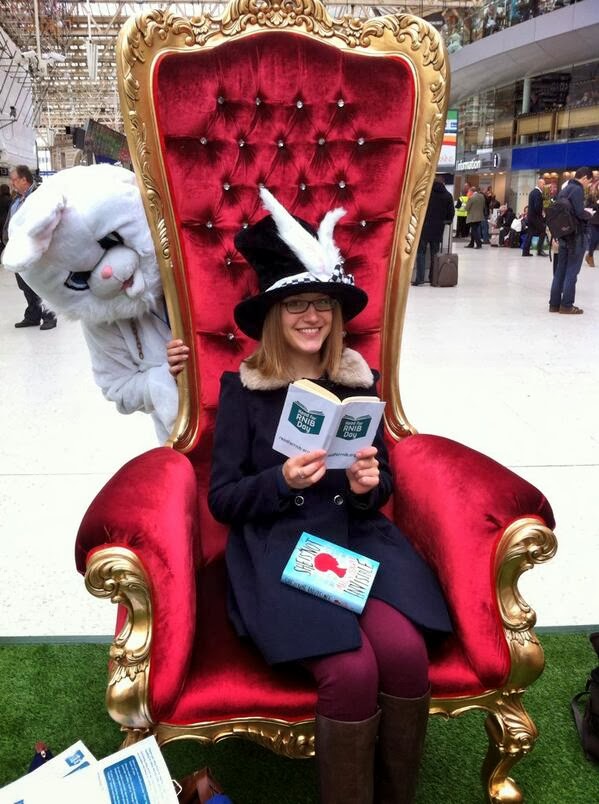 |
| Aged 3. Already quite weird. |
I couldn’t even process this. I knew perfectly well that everyone in the world wanted to be a writer, because writing was the point of existence. My father was a writer. My grandfather was a writer. My aunt was a writer. My grandma was a writer. My mother had not written a book yet, but I figured that was just because she was a late bloomer. With all those stories that I knew must be in everyone else's head, the way they were in mine, why would anyone not want to be a writer?
Of course, since then, I’ve realised that not everyone's brain is like mine - not even all other writers'. I know writers who began writing as fairly mature adults, who’d never even thought of doing it before that moment. I know writers who disliked reading as children, writers who dislike reading even now, and even writers who don’t really enjoy the act of writing - to them it's a 9-5, Monday-Friday thing. There are writers who can drop themselves into their story, write it (brilliantly and beautifully) and then disengage from it entirely.
Basically, there are as many ways of being a writers as there are writers themselves, and what I've learnt is that these are all equally valid. There is no correct way to write, and there is no Platonic ideal of a writer - all of the methods I've described are equally likely to lead to the creation of wonderful books.
For me, though, writing isn't a job, or a chore, or even a conscious decision. It’s just something that my brain does automatically. I wake up, I eat breakfast, I make up stories. They're always there, swimming around in my head - and trying to ignore them just makes me stressed. When I don't write for a while, I begin to feel incomplete, like I'm moving through the world with one hand tied behind my back. I have to write. It's the way I process life.
 |
| What I look like when I'm writing (note: not really) |
It's how I switch off, how I relax, the place I go when the rest of the world is just too much to handle. When I start typing, I can feel myself breathing out. I write myself calm, every morning on the way to work, and then I've got something to go back to throughout the day. I keep picking away at the puzzle of what happens next - and by the time I open my laptop the next morning my head's stuffed full of my next scene.
I do wonder whether there's a connection between why I write and the stuff that comes out onto the page when I do. You see, although murder in the real world is a nasty business, murder in fiction is absolutely the opposite. It's actually one of the safest and most measured plots to deal with. As the author, you have a set number of suspects, in a set environment, with only a certain amount of clues that must lead to only one single correct solution.
Detective fiction (as opposed to thrillers, which can be extremely wide-ranging - probably why I don't write thrillers) is all about leaving the rest of the world behind. It's not important. What matters are the little details that exist within the perimeters you have set yourself in your story. The texture of this scrap of cloth left hanging on this particular nail. The way this particular window has shattered. The exact depth that this parsley has sunk into this pat of butter on one very special hot day in summer. It's really quite beautiful.
Detective fiction is all about simplicity and calm - the trick that the author is really playing on their readers is in making them believe that the story they've put together is even slightly complex. My genre is basically authorial therapy.
But all the same, if I didn't write crime fiction, I know I'd just start writing something else. There are writers who can stop - but I'm not one of them. The idea of taking time off from writing is never really going to work for me. For better or worse, I am who I am because I write.
This is great. And totally not like me. It's definitely not as calm and easy on my side; I'm one of those people who love 'having written' much more than they love 'writing'. So interesting.
ReplyDeleteIt does mean that when I'm having problems with plot, my whole brain is in disarray. I was angry for days because a teacup clue WOULD NOT PLAY BALL.
DeleteAnd I'm always so interested in the way other writers write - our methods are so different, but both clearly work!
Great post and I LOVE the picture. The nearest I get to a writing process seems to be that my brain collects things that have made me laugh/think during the day and then mulches them together and turns them into stories later when I'm relaxed.
ReplyDeleteMy book is basically the result of a week where I:
i) saw an abandoned pair of burnt shoes,
ii) heard about a portaloo cleaning machine operator who pressed the wrong button and showered festival goers in poo (still don't know if it was true but it did make me giggle)
iii) read a lot about eidetic/photographic memory, which seems to be a (sort of) thing in my family.
Followed by a weekend when I slept a lot and did a lot of writing.
Ta da - The Case of the Exploding Loo. I think if I wasn't a writer, I might be a lunatic :)
Writers have people in their heads who talk to them all the time - not at ALL like lunatics!
DeleteI'm so glad you liked the post. And The Case of the Exploding Loo sounds amazing! :)